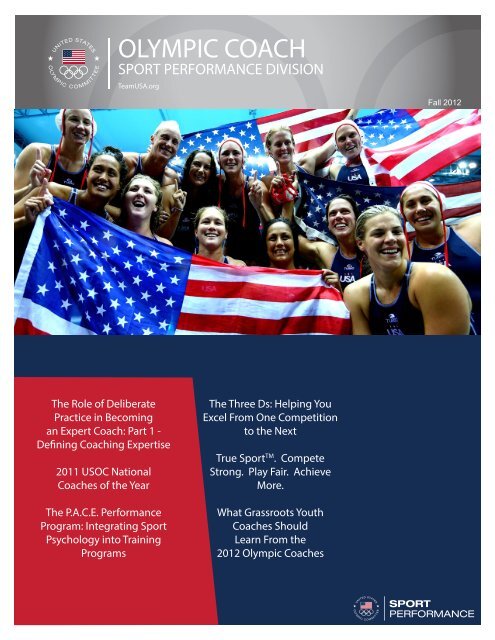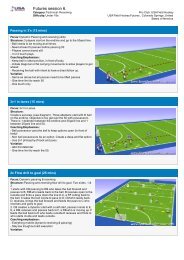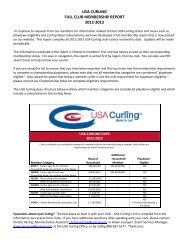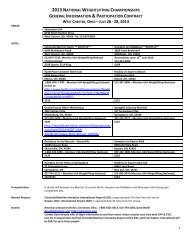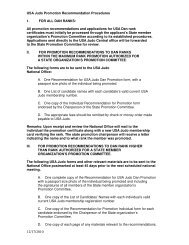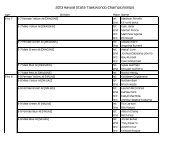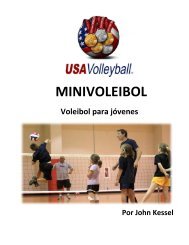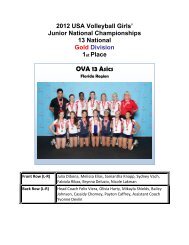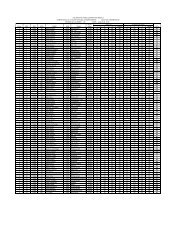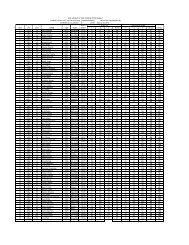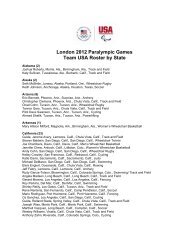OLYMPIC COACH - United States Olympic Committee
OLYMPIC COACH - United States Olympic Committee
OLYMPIC COACH - United States Olympic Committee
- TAGS
- olympic
- www.teamusa.org
Create successful ePaper yourself
Turn your PDF publications into a flip-book with our unique Google optimized e-Paper software.
<strong>OLYMPIC</strong> <strong>COACH</strong><br />
SPORT PERFORMANCE DIVISION<br />
TeamUSA.org<br />
The Role of Deliberate<br />
Practice in Becoming<br />
an Expert Coach: Part 1 -<br />
Defining Coaching Expertise<br />
2011 USOC National<br />
Coaches of the Year<br />
The P.A.C.E. Performance<br />
Program: Integrating Sport<br />
Psychology into Training<br />
Programs<br />
The Three Ds: Helping You<br />
Excel From One Competition<br />
to the Next<br />
True Sport TM . Compete<br />
Strong. Play Fair. Achieve<br />
More.<br />
What Grassroots Youth<br />
Coaches Should<br />
Learn From the<br />
2012 <strong>Olympic</strong> Coaches<br />
Fall 2012
<strong>United</strong> <strong>States</strong> <strong>Olympic</strong> <strong>Committee</strong><br />
Board of Directors<br />
Robert Bach<br />
James Benson<br />
Larry Probst, Chairman<br />
Bob Bowlsby<br />
Ursula Burns<br />
Anita DeFrantz<br />
James Easton<br />
John Hendricks<br />
Nina Kemppel<br />
Jair Lynch<br />
Susanne Lyons<br />
Mary McCagg<br />
Dave Ogrean<br />
Michael Plant<br />
Angela Ruggiero<br />
Scott Blackmun, CEO (non-voting)<br />
Chief Executive Officer<br />
Scott Blackmun<br />
Publisher<br />
<strong>United</strong> <strong>States</strong> <strong>Olympic</strong> <strong>Committee</strong><br />
Coaching Education Department<br />
1 <strong>Olympic</strong> Plaza<br />
Colorado Springs, Colorado<br />
Editor<br />
USOC Coaching Education Department<br />
Christine Bolger 719.866.2551<br />
Christine.Bolger@USOC.org<br />
<strong>Olympic</strong> Coach is a publication of the <strong>United</strong> <strong>States</strong><br />
<strong>Olympic</strong> <strong>Committee</strong> Sport Performance Division/Coaching<br />
Education Department. Readers are encouraged to<br />
submit items of interest for possible inclusion. Submitted<br />
materials will be acknowledged, but cannot be returned<br />
and inclusion is not guaranteed. Materials should be sent<br />
to Christine Bolger at Christine.Bolger@USOC.org.<br />
<strong>Olympic</strong> Symbols, marks and terminology are reserved<br />
for the exclussive use of the USOC under 36 USC 22506.<br />
This publication is copyrighted by the U.S. <strong>Olympic</strong><br />
<strong>Committee</strong> and contents may not be reproduced<br />
without permission.<br />
2<br />
3<br />
Contents<br />
5....The P.A.C.E. Performance Program:<br />
Integrating Sport Psychology into<br />
Training Programs<br />
Alex Cohen, Ph.D., CC-AASP, Senior Sport<br />
Psychologist, <strong>United</strong> <strong>States</strong> <strong>Olympic</strong> <strong>Committee</strong><br />
10....True Sport TM : Compete Strong. Play Fair.<br />
Achieve More.<br />
Erin Hannan,Communication and Outreach Director,<br />
US Anti-Doping Agency<br />
12...2011 USOC National Coaches of the Year<br />
15....The Three Ds: Helping You Excel From<br />
One Competition to the Next<br />
Jim Afremow, Ph.D., Arizona State University<br />
17...What Grassroots Youth Coaches Should<br />
Learn From the 2012 <strong>Olympic</strong> Coaches<br />
David Jacobson, Marketing and Communications<br />
Manager, Positive Coaching Alliance<br />
19.....The Role of Deliberate Practice in<br />
Becoming and Expert Coach: Part 1 -<br />
Defining Coaching Expertise<br />
Wade Gilbert, Ph.D., Fresno State University, USA<br />
Pierre Trudel, Ph.D., University of Ottawa, Canada
<strong>Olympic</strong> Coach Magazine<br />
3<br />
Message from the<br />
Chief of Sport Performance<br />
Alan Ashley<br />
Volume 23, Issue 3<br />
Greetings! When our last issue of <strong>Olympic</strong> Coach published in June, we were moving toward the final<br />
preparation stages for the London <strong>Olympic</strong> and Paralympic Games. Here we are now in October with one<br />
of the most successful <strong>Olympic</strong> Games in history behind us. It was great to return from London to find so<br />
many people throughout our country energized by the excellence of Olympians and Paralympics. Our <strong>Olympic</strong><br />
family and all of Team USA are incredibly proud of the performances by Team USA athletes in London.<br />
Not only were the overall performances inspiring, but Team USA had a number of “firsts” including USA Judo<br />
winning their first gold medal ever through Kayla Harrison’s inspiring performance, the first medal in women’s<br />
boxing – gold by USA Boxing’s Clarissa Shields, USA Swimming’s Michael Phelps becoming the most<br />
decorated Olympian ever, and USA Diving’s incredible gold medal performance by David Boudia in men’s<br />
10m platform diving. On the Paralympic side we saw inspiring gold-medal performances with swimmer Jessica<br />
Long (eight medals, five gold), three-time gold medalist Marianna Davis in Road Cycling, and Track and<br />
Field’s Tatyana McFadden’s four medal performance (three gold, one bronze).<br />
I want to personally thank all of the support staff around the athletes – from coaches to high performance<br />
staff to our sponsors and partners – for making these world-class performances possible. It takes a team<br />
to support athletes in achieving their full potential and the role of their coaches in many cases provide the<br />
cornerstone in creating that environment. My experience from London is that often times these individuals<br />
go nearly unrecognized in the movement, and as we look forward we need to strike the right balance so that<br />
the leaders who assist the athletes on the field of play are appropriately acknowledged for their contributions<br />
to high performance sport.<br />
The celebrations have continued for Team USA following the fantastic performances in London, including the<br />
White House visit for the Olympians and Paralympians in Washington, D.C. More than 400 athletes visited<br />
with President and Mrs. Obama where they were honored and enjoyed a very warm welcome, sharing photo<br />
opportunities and their stories with the White House family.<br />
Currently, we have a number of initiatives, not the least of which is preparation for Sochi 2014. Our Winter<br />
NGBs and Sport Performance staff have already been on the ground in Sochi, learning more about the venues<br />
and area in order to support Team USA in pursuit of their <strong>Olympic</strong> and Paralympic dreams. As we say,
<strong>Olympic</strong> Coach Magazine<br />
4<br />
Volume 23, Issue 3<br />
it’s not every four years, it’s every day. We’re also proud to support the University of Delaware’s International<br />
Coaching Enrichment Certificate Program (ICECP) by hosting the coaches from developing nations at the<br />
Colorado Springs <strong>Olympic</strong> Training Center to learn more about high performance and sustaining coaching<br />
education programs in their home countries. This is also the first year that we’re able to support some of our<br />
Team USA coaches in this program, so we’re excited to provide this as an additional form of professional development.<br />
Moving forward, USOC Sport Performance continues to transition from post-Games in London with some<br />
recovery strategies you’ll read about in this issue, including the P.A.C.E. program article by the USOC’s Alex<br />
Cohen, outlining the importance of recovery. We are also pleased to include co-authors Wade Gilbert and<br />
Pierre Trudel’s article that addresses defining coaching expertise, and we look forward to subsequent articles<br />
in future issues of <strong>Olympic</strong> Coach. And we continue to celebrate our USOC Coaches of the Year who were<br />
honored this past June at the National Coaching Conference in Indianapolis.<br />
I hope you enjoy this issue of <strong>Olympic</strong> Coach, and as always, please let our USOC team know if you have<br />
questions or comments.<br />
World Record-setting and Gold Medal-winning Women’s 4x100m Relay Team - Allyson Felix, Carmelita Jeter, Bianca<br />
Knight, Tianna Madison, Photograph by Alexander Hassenstein, Getty Images
<strong>Olympic</strong> Coach Magazine<br />
5<br />
Volume 23, Issue 3<br />
The P.A.C.E. Performance Program: Integrating Sport Psychology into Training<br />
Programs<br />
Alex Cohen, Ph.D., CC-AASP, Senior Sport Psychologist, <strong>United</strong> <strong>States</strong> <strong>Olympic</strong> <strong>Committee</strong><br />
P.A.C.E. (Perception, Activation, Concentration, Execution)<br />
Following Team USA’s successful performances at the London 2012 <strong>Olympic</strong> and Paralympic Games,<br />
coaches and athletes are already preparing for their upcoming season of competitions. What are the<br />
next steps to take in readying your athletes for performance excellence? After competing in the <strong>Olympic</strong><br />
Games, athletes have consistently reported that, for their next Games experience, they would: a)<br />
focus more on sport psychology and mental preparation; b) avoid overtraining/under-recovery and get<br />
more rest; c) work with their coaches to optimize their physical training/preparation; and d) find ways to<br />
be better prepared to deal with distractions (Gould, Greenleaf, Guinan, Dieffenbach, & McCann, 2001;<br />
Gould, Greenleaf, Chung, & Guinan, 2002). The P.A.C.E. performance program addresses these<br />
concerns by enabling coaches to enhance their athletes’ psychological skills at the same time they are<br />
improving their athletes’ physical, technical, and tactical sports skills. Incorporating the P.A.C.E. performance<br />
program into the periodized training schedule can help your athletes peak for performance by<br />
training them to focus on the right things, at the right time, every time.<br />
Each of the elite coaches I’ve been fortunate to work with incorporate aspects of sport psychology into<br />
their training programs, though they may refer to this type of training by many different names. The<br />
P.A.C.E. performance program was designed with these coaches in mind, as a simple acronym to<br />
organize and teach psychological skills during training. P.A.C.E. refers to “Perception, Activation,<br />
Concentration, Execution”. While each of the P.A.C.E. components can be worked on individually, I<br />
present the program to coaches as an ordered sequence, to provide a simple and comprehensive overview<br />
of psychological skills training for performance excellence. While every sport is unique, I think this<br />
model can be flexibly applied to many different sport disciplines. Each of the program components will<br />
now be described, and then ways to integrate this model into training are explored.<br />
P.A.C.E. program components:<br />
Perception refers to an athlete’s thoughts, feelings, imagery, and self-talk about his/her:<br />
• Technical and psychological skills (e.g., emotional control, coping, etc.);<br />
• The performance environment;<br />
• The goals the athlete wants to achieve (i.e., outcome and performance goals; Roberts & Kristiansen,<br />
2010).<br />
The athlete’s perceptions (e.g., appraisals, attributions, and their effect on motivation) serve as antecedents<br />
for emotion. Athletes experience (and subjectively interpret) a range of pleasant and unpleasant<br />
emotional states, in which changes in physiological activation and accompanying action tendencies<br />
are often the most tangible indicators of internal emotional status (Vallerand & Blanchard, 2000).<br />
Perceptions are therefore clearly linked to Activation (physiological arousal), which exists along a<br />
continuum of deep sleep to extreme excitation (Weinberg, 2011). Emotion-related activation can be<br />
tracked by assessing the athlete’s Individual Zone of Optimal Functioning (IZOF). The IZOF represents
<strong>Olympic</strong> Coach Magazine<br />
6<br />
Volume 23, Issue 3<br />
the emotional experiences related to successful or poor performance (Hanin, 2000; Cohen, Tenenbaum,<br />
& English, 2005). Once determined, the IZOF is attained through use of emotional regulation<br />
skills (e.g., coping, mindfulness) as well as energy management skills - relaxation and activation - to<br />
achieve the desired level of physiological activation for performance. Finding the appropriate activation<br />
level is essential, not only for maximum energy availability, but also due to the effects of activation<br />
on concentration. For example, as physiological activation increases, attentional capacity often decreases<br />
(Moran, 2004). Further, anxiety and physiological arousal can affect visual attention, altering<br />
the way athletes identify and process visual cues (Janelle, 2008). In essence, if an athlete’s activation<br />
level increases above his or her IZOF, it may cause inappropriate attentional focus and poor decision<br />
making (Weinberg, 2011). Since appropriate attention allocation cannot be overstated in determining<br />
performance outcome (Janelle, Coombes, & Gamble, 2010) athletes and coaches must be aware of<br />
the influence of activation on concentration.<br />
Concentration is the athlete’s ability to exert deliberate mental effort on what is most important in any<br />
given situation (Moran, 2011). Athletes need to selectively attend to relevant information and ignore<br />
potential distractions, while coordinating several simultaneous actions. It is therefore critical for coaches<br />
to create an environment in which athletes learn how to adjust concentration at will and know what<br />
to focus on at the correct time.<br />
Distractions can be particularly performance impairing for elite athletes because of the automaticity of<br />
their skills. Because these athletes have largely automated their technical skills as a result of extensive<br />
practice, they tend to have extra mental capacity available to devote to other concurrent tasks – thereby<br />
increasing distractibility (Moran, 2011). It is clear, then, that concentration has a definite impact on<br />
skill Execution. Each of the P.A.C.E. components is integrated into the athlete’s Performance Plan,<br />
comprised of the specific thoughts, words, images, feelings, and behaviors developed for competition,<br />
including mental, physical, and technical strategies.<br />
With this sequential P.A.C.E. model in mind, the following examples illustrate how proper use of wellpracticed<br />
psychological skills can enhance performance, while lack of disciplined training in this area<br />
can impair performance or contribute to inconsistency. Imagine an athlete minutes before competition,<br />
going through his or her pre-competition routine. The hard work and training has been done, yet<br />
a number of unpleasant thoughts appear, unexpectedly: “What if I’m not ready? What if I’m not good<br />
enough?” Breathing becomes shallow, muscles tighten, heart rate climbs…and the athlete’s focus is<br />
inappropriately divided - directed to improper cues. Rather than staying with the process of competing,<br />
the athlete is now trying not to lose, concentrating on all of the things that could go wrong. Clearly, this<br />
is not the most helpful path to executing the performance plan. Now let’s consider an alternate example,<br />
in which more adaptive perceptions lead to the appropriate amount of physiological activation,<br />
allowing the athlete to focus on task-relevant cues. As part of the pre-performance routine, the athlete<br />
mindfully acknowledges any unpleasant thoughts or feelings, and then, through extensive practice in<br />
letting them go, calmly returns to the thoughts, images, and self-statements that are connected to the<br />
ideal pre-performance activation level. This in turn allows for flexibility in focus, as the athlete notes<br />
and discards distractions, concentrating only on the simple keys that facilitate execution of the performance<br />
plan. The perception in this scenario may be something like, “The outcome I want is _______,<br />
and the best way to get there is to keep it simple. All I have to do is focus on the process of performing.”<br />
This more adaptive perception leads to effective breathing, primed (but not tight) muscles, and
<strong>Olympic</strong> Coach Magazine<br />
7<br />
Volume 23, Issue 3<br />
a heart rate zone that is tuned to this particular performance. The plan is clear in the athlete’s mind, allowing<br />
for any necessary adjustments (re-focusing) in response to varying competition conditions.<br />
The easiest way to integrate the P.A.C.E. model is to think about areas of the training plan that present opportunities<br />
to practice psychological skills. Check in with your athletes’ perceptions of their technical and<br />
psychological skills and see if they’re adaptive or unhelpful. Briefly discuss the specific, challenging goals<br />
you and your athletes want to achieve for each practice session. These goals may be to improve power,<br />
endurance, strength, technique, strategy, emotional control, etc., depending on the periodization phase<br />
and proximity to competition. To monitor perceptions about the performance environment, use competition<br />
simulation for “practicing under pressure,” with an emphasis on thoughts, feelings, and self-talk designed to<br />
increase consistency during competition.<br />
Assessing activation level can be accomplished subjectively and objectively. Use of heart rate monitors can<br />
provide a crude indicator of physiological arousal, as can asking your athletes to rate their energy level on<br />
a scale from 1-10 (similar to assessing rate of perceived exertion, or RPE). It doesn’t require much time to<br />
raise your athletes’ awareness about their activation level and the relaxation or energizing skills needed to<br />
adjust it.<br />
As a coach, it was often easy to see where my athletes were sending their focus, simply by observing body<br />
language. These behavioral observations provided an opportunity to ask the athlete about his or her concentration,<br />
and to offer guidance in adjusting attentional control as needed to maintain focus on important<br />
performance cues. Since focus can be internal, external, narrow, or broad (Nideffer, 1990), athletes must<br />
be able to train their concentration skills in each of these areas. For example, leading up to a competition,<br />
an athlete may go through a progression similar to this:<br />
1. Broad-External: Assess the environment and the competition.<br />
2. Broad-Internal: Recall individual strengths, review the performance plan.<br />
3. Narrow-Internal: Monitor arousal level, mentally rehearse process skills.<br />
4. Narrow-External: Focus on a good start, simple cues or keys that make performance automatic.<br />
Competition simulation presents an excellent opportunity to practice concentration and re-focusing skills<br />
while implementing a performance plan. This brings us to the last phase in the P.A.C.E. model: execution.<br />
Have your athletes think about the performance plan they used in their best performances. Deliberate<br />
practice and disciplined preparation helped them to trust this plan and commit to it before and during competition.<br />
A simple and comprehensive plan should address pre-competition; warm-up; competition; any possible<br />
distractions before, during, and after competition; and post-competition performance evaluation. The<br />
performance plan is a purposeful mental and physical routine that helps athletes to consistently perform at<br />
the top of their ability.<br />
The performance plan should be simple and clear. To consistently deliver excellent performance, athletes<br />
must monitor their perceptions, regulate activation level, and adjust concentration to execute their plan. In<br />
the weeks and days just prior to important competitions such as world championships and <strong>Olympic</strong> and<br />
Paralympic Games, athletes sometime believe they need to change things to achieve success. This is<br />
when coaches must emphasize that their athletes don’t need to do anything differently or more than they’ve
<strong>Olympic</strong> Coach Magazine<br />
8<br />
Volume 23, Issue 3<br />
already done. Confidence during competition occurs when athletes trust their preparation and training, focusing<br />
on execution of learned skills.<br />
Coaches are ideally positioned to incorporate aspects of sport psychology into training, complimenting physical,<br />
technical, and tactical skill acquisition and maintenance. The P.A.C.E. performance program is designed<br />
to help coaches create an optimal learning environment that allows for repetition of these skills, making it<br />
easier for athletes to automatically execute their performance plans, and increasing the likelihood of consistent<br />
performance excellence.<br />
References<br />
Cohen, A., Tenenbaum, G., & English, W. (2005). Emotions and golf performance: An IZOF-based applied<br />
sport psychology case study. Behavior Modification, Vol. 30, 3, 259-280.<br />
Gould, D., Greenleaf, C., Guinan, D., Dieffenbach, K., & McCann, S. (2001). Pursuing performance excellence:<br />
Lessons learned from <strong>Olympic</strong> athletes and coaches. Journal of Performance Excellence,4, 21-43.<br />
Gould, D., Greenleaf, C., Chung, Y., & Guinan, D. (2002). A survey of U.S. Atlanta and Nagano Olympians:<br />
Factors influencing performance. Research Quarterly for Sport and Exercise,73(2), 175-186.<br />
Hanin, Y. L. (2000). Individual zones of optimal functioning (IZOF) model: Emotion-performance relationships<br />
in sport. In Y. Hanin (Ed.), Emotions in Sport. Human Kinetics: Champaign, IL<br />
Janelle, C. M. (2008). Anxiety, arousal, and visual attention: A mechanistic account of performance variability.<br />
Journal of Sports Sciences, 2002, 20, 237-251.<br />
Janelle, CM., Coombes, S.A., & Gamble, K.M. (2010). The motion of emotion: Affective<br />
influences on movement planning and execution. In T. Marek, W. Karwowski, & V. Rice<br />
(Eds.), Advances in Understanding Human Performance: Neuroergonomics, Human Factors<br />
Design, and Special Populations. New York: Taylor and Francis.<br />
Moran, A. (2004). Staying focused in sport: Concentration in sport performers. In A. Moran (Ed.), Sport and<br />
Exercise Psychology: A Critical Introduction. Routledge: New York, NY.<br />
Moran, A. (2011). Concentration/attention. In S. Hanrahan and M. Anderson (Eds.), Routledge Handbook of<br />
Applied Sport Psychology. Routledge: New York, NY.<br />
Nideffer, R.M. (1990). Use of the test of attentional and interpersonal style in sport. The Sport Psychologist, 4,<br />
285-300.<br />
Roberts, G. and Kristiansen, E. (2011). Motivation and goal setting. In S. Hanrahan and M. Anderson (Eds.),<br />
Routledge Handbook of Applied Sport Psychology. Routledge: New York, NY.
<strong>Olympic</strong> Coach Magazine<br />
9<br />
Volume 23, Issue 3<br />
Vallerand, R.J., and Blanchard, C.M. (2000). The study of emotion in sport and exercise: Historical, definitional,<br />
and conceptual perspectives. In Y. Hanin (Ed.), Emotions in Sport. Human Kinetics: Champaign, IL<br />
Weinberg, R. (2011). Activation/arousal control. In S. Hanrahan and M. Anderson (Eds.), Routledge Handbook<br />
of Applied Sport Psychology. Routledge: New York, NY.<br />
Alex Cohen is a Senior Sport Psychologist with the <strong>United</strong> <strong>States</strong> <strong>Olympic</strong> <strong>Committee</strong> in Colorado<br />
Springs, CO, working primarily with Winter <strong>Olympic</strong> Sports. As a licensed psychologist and AASPcertified<br />
sport psychology consultant, he provides individual and team consultations and counseling<br />
for national teams, athletes, and coaches at the <strong>Olympic</strong> Training Centers in Colorado Springs, CO<br />
and Lake Placid, NY, as well as at various national governing body training sites and national and<br />
international competitions.<br />
David Boudia, Gold Medalist Men’s 10 meter Platform, London. Photographer: Clive Rose, Getty Images
<strong>Olympic</strong> Coach Magazine<br />
True Sport: Compete Strong. Play Fair. Achieve More.<br />
Erin Hannan, Communication and Outreach Director, U.S. Anti-Doping Agency<br />
10<br />
Volume 23, Issue 3<br />
An important part of being an athlete – at any level – is performing well. At the heart of competition is the reward<br />
that comes from discovering your potential and achieving your goals. Even without medals or acclaim,<br />
participating in sports is tremendously rewarding. But along with glory and success there can be challenges:<br />
pressures, insecurity, temptations, and even fear. How one faces these challenges defines the kind of athlete<br />
one is.<br />
Every day we hear about rule violations, ethics breaches, and the use of performance-enhancing substances<br />
in sport. These behaviors trickle down to youth in the form of early specialization, overtraining, scholarship<br />
pressure, overzealous parents, under-qualified coaches, and even performance-enhancing tactics at young<br />
ages. These lead to a focus on winning without considering what it actually means to achieve. Tough, highperforming<br />
teams win and should want to win! And they can gain this success with true achievement.<br />
Sport is a valuable national asset that is woven into the tapestry of our culture. More than 200 million people<br />
in this country have a relationship to sport, whether as active participants, parents of players, coaches, spectators,<br />
or volunteers. One of our most beloved pastimes and endeavors, sport touches the lives of most<br />
Americans, and it plays a critical role in educating youth and shaping the national culture. However, the<br />
rewards and pressures of sport can engender negative actions and dangerous behavior, such as cheating<br />
and doping. We recognize the important life-lessons and values sport teaches. True Sport aims to instill and<br />
cultivate the positive possibilities of sport, beginning with our youngest athletes.<br />
According to “What Sport Means in America: A Study of Sport’s Role in Society,” Americans believe that<br />
performance-enhancing drugs are the number one issue facing sport today. Our country is experiencing the<br />
devastating consequences of a culture that often prioritizes winning and taking shortcuts, both in sport and<br />
in life. Our children will benefit from values and behaviors that shift this attitude toward a redefined notion of<br />
winning that focuses on the journey, and celebrates each stage of the process in addition to the end results.<br />
At least 50 million young people are involved in sport. Therefore, we have 50 million reasons to support and<br />
protect the positive life lessons learned through sport. Most kids won’t go on to collegiate or professional<br />
careers, so the benefits of sport will help them most in other life paths. We are not alone in our deep-seated<br />
passion for sport, and our desire to ensure that sport fulfills its rich promise. It’s a great time for all of us to<br />
get involved in doing something about it.<br />
This is where True Sport comes to life.<br />
True Sport is an innovative initiative powered by the U.S. Anti-Doping Agency (USADA), created to help<br />
enhance and preserve the future of sport in America. Focused on healthy performance strategies in sports<br />
and in life, True Sport is based on core ethical principles, high-impact programming, and a depth of instructive<br />
resources, including comprehensive coaching education in Fall 2012.
<strong>Olympic</strong> Coach Magazine<br />
11<br />
Volume 23, Issue 3<br />
Ultimately, True Sport can impact sport at every level – from Little Leaguers to Olympians, from weekend<br />
warriors to professional competitors. True Sport is a resource for parents and coaches, school districts,<br />
after-school programs, youth sport leagues, and communities where people believe that sport leads to<br />
health and social connectedness, builds character, and promotes ethical behavior and positive values.<br />
Being a True Sport means finding your unlimited potential, and path to winning and achievement, through<br />
hard work, respect, integrity, and the commitment to protecting sport from a win-at-all costs culture.<br />
Visit www.TrueSport.org for more information.<br />
Erin Hannan is the Communications and Outreach Director for the U.S. Anti-Doping Agency<br />
(USADA), focused on contributing to a positive atmosphere in which the anti-doping movement can<br />
prosper and facilitate effective change. Her particular concentration is on ensuring that<br />
competing athletes and our nation’s youth are equipped with valuable tools and skills for making<br />
healthy, informed, and ethical choices for their lives.
<strong>Olympic</strong> Coach Magazine<br />
12<br />
Volume 23, Issue 3<br />
2011 USOC National Coaches of the Year<br />
The USOC was pleased to honor the finalists for the 2011 National Coach of the Year program at the National<br />
Coaching Conference in Indianapolis this past June where the national award winners in each category<br />
were announced.<br />
Rick Bower<br />
2011 USOC National Coach of the Year<br />
During his six seasons as coach of the U.S. snowboarding<br />
halfpipe team, Bower has played an integral<br />
role in advancing women’s snowboarding. In<br />
2011, he led his athletes to 31 major event podiums<br />
and took snowboarding to new heights after helping<br />
Kelly Clark become the first female to land a 1080<br />
in competition. This achievement, at the pinnacle of<br />
snowboarding events for the year, had a monumental<br />
influence on up-and-coming female athletes and<br />
the progression of women’s snowboarding. For his<br />
efforts, Bower was recognized as the U.S. Ski and<br />
Snowboard Association International Coach of the<br />
Year and USSA International Snowboarding Coach of<br />
the Year in 2011.<br />
Dave Denniston<br />
2011 USOC Paralympic Coach of the Year<br />
In his second year as a U.S. Paralympics resident<br />
swimming coach at the U.S. <strong>Olympic</strong> Training Center<br />
in Colorado Springs, Colorado, Denniston was<br />
selected to lead Team USA at the Pan-Pacific Para-<br />
Swimming Championships. In 2011, 14 of his 16<br />
athletes were selected to major international teams,<br />
where they consistently exceled on the world stage.<br />
Among his athletes, Jessica Long collected nine gold<br />
medals in nine events, while shattering four world<br />
records. A 2008 U.S. Paralympian, Denniston also<br />
conducts speaking engagements to share his journey<br />
from an able-bodied <strong>Olympic</strong> hopeful to a Paralympic<br />
athlete turned mentor. His experience has allowed<br />
him to integrate his team practices with elite ablebodied<br />
team practices, helping assist athletes on<br />
both teams reach higher goals.
<strong>Olympic</strong> Coach Magazine<br />
13<br />
Volume 23, Issue 3<br />
James Hrbek<br />
2011 USOC National Developmenmtal Coach of<br />
the Year<br />
Devoted to building the sport of judo in the <strong>United</strong><br />
<strong>States</strong>, Hrbek scours the world to find unique judo<br />
tournaments and training opportunities for young<br />
Americans to gain international experience. In 2011,<br />
he coordinated the entire junior program for USA<br />
Judo, which fielded U.S. teams for dozens of national<br />
and international tournaments and assembled U.S.<br />
contingents of more than 50 people. As chairman of<br />
USA Judo’s Junior Athlete Performance <strong>Committee</strong>,<br />
Hrbek created a database of parents, coaches, and<br />
athletes that can be used in various judo activities.<br />
It is his belief that if properly educated, U.S. junior<br />
athletes will have the knowledge to one day become<br />
successful coaches themselves, an essential step in<br />
building the sport nationally.<br />
Tom Waqa<br />
2011 USOC National Volunteer Coach of the Year<br />
Now in his sixth season as the head coach of<br />
Brigham Young University women’s rugby team,<br />
Waqa has played a key role in molding an unsponsored<br />
and formerly unrecognized team into a nationally<br />
ranked formidable force. The Fiji native has<br />
helped produce All-American nominees in each of his<br />
seven seasons, highlighted by 2011 honorees Kristi<br />
Jackson, Monica Jackson and Rebekah Siebach,<br />
who propelled the Cougars to the Final Four. He also<br />
helps identify young talent to compete in the Under-20<br />
National All-Star Championships, which routinely<br />
produce scouting opportunities for U.S. national<br />
teams. In addition to coaching at BYU, Waqa also<br />
volunteers as the Humless men’s rugby coach.
<strong>Olympic</strong> Coach Magazine<br />
14<br />
Volume 23, Issue 3<br />
Neal Henderson<br />
2011 Doc Counsilman Science & Technology<br />
Award<br />
For years, Henderson has been at the forefront of<br />
applying scientific principles in the lab and on the<br />
field to improve athlete performance in the world of<br />
cycling. During the 2010-11 season, he formulated<br />
additional tools and protocols for aerodynamic drag<br />
analysis, which helped determine the specific power<br />
required for cyclists to attain a given speed. The results<br />
helped pace Team USA to a silver-medal finish<br />
at the 2011 UCI Track Cycling World Championships.<br />
Later that summer, Henderson continued aerodynamic<br />
testing to help identify the best wheel combinations<br />
for U.S. cyclists competing at the London 2012 <strong>Olympic</strong><br />
Games. A rare, dual-certified elite U.S cycling and<br />
U.S. triathlon coach, Henderson has been instrumental<br />
in establishing training methods based on exercise<br />
physiology, including supplemental oxygen training<br />
and a computrainer program for junior cyclists at the<br />
Boulder Center for Sports Medicine.<br />
Congratulations to all of the national award winners, finalists, and NGB coaches of the year. The deadline<br />
for NGBs to nominate their coaches for competition year 2012 is January 15, 2013. 2012 Coach of<br />
the Year finalists will be honored at the 2013 National Coaching Conference in Colorado Springs June<br />
19 - 21. Contact Christine Bolger (Christine.Bolger@USOC.org) for additional details.
<strong>Olympic</strong> Coach Magazine<br />
The Three Ds: Helping You Excel From One Competition to the Next<br />
Jim Afremow, Ph.D., Arizona State University<br />
15<br />
Volume 23, Issue 3<br />
With both the London 2012 <strong>Olympic</strong> and Paralympic Games in our rearview mirror, now is the time<br />
to set your sights high—and start mentally and physically preparing—for the next major competition.<br />
The “three Ds” are the key feature to winning the mental periodization process: debrief, decompress,<br />
and dominate. Periodization refers to how a training program is divided into discreet time periods<br />
or phases. You should try to recognize these Ds as unique, and overlapping, aspects of an ongoing<br />
commitment to superiority in your sport. Once they are firmly in place, you will be able to excel from<br />
one major competition to the next.<br />
Debrief. As a mechanism for ongoing improvement, debrief your performance in terms of your technique,<br />
strategy, and mental approach. Specifically, ask yourself: What did I do that was good? What<br />
needs to get better? What changes should I make to become my best? After answering these questions,<br />
immediately put into practice the changes you need to make. Remember: don’t talk about it; be<br />
about it. The aim is to give yourself credit for what you did well and to start working on the right things<br />
in training so that you can win your next athletic challenge.<br />
Make sure to celebrate what you want to see happen. Take time to pause and reflect on what was<br />
good and what worked. These highlights offer a glimpse into your true potential. Too often, we think<br />
back to what went wrong or what we did not do rather than focusing on what went well or what we<br />
accomplished. If you did not perform at your best or accomplish all of your goals, the debriefing process<br />
will help you to turn the page and confidently move forward—ensuring that there will be brighter<br />
things to come. Always celebrate what you have done well and learn from feedback so that you can<br />
do even better the next time. Do not overestimate your defeats. Do not undervalue your successes,<br />
either.<br />
Decompress. A champion understands that mental and physical regeneration is one key to sustainable<br />
success. Burning the candle at both ends by overtraining and insufficient recovery results in<br />
burnout and increases the risk of injury and illness. One needs to mentally relax and let the body rest<br />
and recover—especially post-<strong>Olympic</strong>s. Think of regeneration as the Yin to training’s Yang. Practicing<br />
deep relaxation on a daily basis will help you to quiet your mind and keep physical tension at<br />
a minimum. Heed these words by the ancient Chinese philosopher Lao Tzu: “Deal with the small<br />
before it becomes large.” Strive to release stress and tension as soon as you notice it is beginning to<br />
build.<br />
Take plenty of time to decompress, to get away from the sport, and to get back to training. Try having<br />
a rest day (or week) without a purpose or goal—other than letting your body rest and rejuvenate!<br />
Also, make room in your schedule for some light-hearted activities. What do you enjoy doing in your<br />
spare time? What are your favorite hobbies and interests? Aim to relax your body away from training<br />
so that you can tax your body in training. To perform at full power, commit to being fully rested and<br />
ready for all of your practices and competitions.
<strong>Olympic</strong> Coach Magazine<br />
Dominate. Create and sustain a winning strategy for<br />
your next major competition. Be proactive in seeking<br />
help for needed improvements from specialists<br />
with unique skills, such as a sports psychologist,<br />
performance trainer, athletic trainer, sports nutritionist,<br />
sports medicine doctor, sports chiropractor, or<br />
other specially trained individual. Working with others,<br />
particularly experts who can help you achieve your<br />
goals, is the antithesis of weakness. Instead, it shows<br />
strength of character and resolve to be the best you<br />
can be.<br />
The importance of the mental side of athletics was<br />
once brilliantly summed up by basketball legend<br />
Kareem Abdul-Jabbar: “Your mind is what makes<br />
everything else work.” As such, in preparing for your<br />
next competition, make sure to: 1) set your goals high<br />
and clarify what it will take to get there; 2) visualize a<br />
positive performance and picture the ideal steps for<br />
achieving the winning result; 3) flex your confidence<br />
muscles by acknowledging your strengths and recalling<br />
past successes; 4) focus on the task at hand to the<br />
exclusion of all else; and 5) stay in love with your sport<br />
by always training with purpose and passion.<br />
How good do you want to be (highest hopes)? How<br />
badly do you want it (commitment level)? As we’ve<br />
learned from the “three Ds” of debrief, decompress,<br />
and dominate, mental periodization is the right path to<br />
take from one major competition to the next. Identify<br />
the important lessons and leave the rest behind. Re-<br />
16<br />
UPCOMING EVENTS<br />
USA Cycling Coaching Summit<br />
October 12 - 14, 2012<br />
Colorado Springs, Colorado<br />
Volume 23, Issue 3<br />
USA Triathlon’s Art & Science of Triathlon<br />
International Coaching Symposium<br />
October 25 - 27, 2012<br />
San Diego, California<br />
7th Annual Coaches and Sport Science<br />
College-East Tennessee State University<br />
December 14 - 15, 2012<br />
Johnson City, Tennessee<br />
AAHPERD National Convention<br />
April 23 - 27, 2013<br />
Charlotte, North Carolina<br />
American College of Sport Medicine’s 60th<br />
Annual Meeting and 4th World Congress on<br />
Exercise is Medicine<br />
May 28 - June 1, 2013<br />
Indianapolis, Indiana<br />
2013 National Coaching Conference<br />
June 19 - 21, 2013<br />
Colorado Springs, Colorado<br />
Visit www.TeamUSA.org for additional events.<br />
group from the high stress and physical demands of competing in the <strong>Olympic</strong> crucible. And then get<br />
right back to being in it to win it—take dead aim at your next goal. Free up your mind to win your next<br />
competition; you’re going for gold!<br />
Jim Afremow, Ph.D., serves as a sport psychologist specialist and a senior counselor at Arizona<br />
State University. Dr. Afremow provides sport psychology services to numerous college,<br />
professional, and <strong>Olympic</strong> athletes. He is the author of the forthcoming book, Gold Medal Mind:<br />
How the Best Athletes Think, Train and Thrive. He can be reached at www.goldmedalmind.net
<strong>Olympic</strong> Coach Magazine<br />
17<br />
Volume 23, Issue 3<br />
What Grassroots Youth Coaches Should Learn From 2012 U.S. <strong>Olympic</strong> Coaches<br />
David Jacobson, Marketing Communications Manager, Positive Coaching Alliance<br />
At Positive Coaching Alliance (PCA), we frequently refer to the <strong>Olympic</strong>s for examples of positive coaching<br />
to share in our live workshop presentations and online courses for youth and high school coaches. Our viewing<br />
of media coverage of the London 2012 Games provided plenty of observable examples.<br />
Most strikingly, three highly successful U.S. <strong>Olympic</strong> Team coaches – Hugh McCutcheon (women’s volleyball),<br />
Pia Sundhage (women’s soccer), and Mike Krzyzewski (men’s basketball) – led their team to medals<br />
largely by relinquishing traditional coaching controls. In various ways, they let their players play, freed them<br />
to be themselves in and out of the competitive arena and displayed deep, emotional intelligence and a deft,<br />
light touch that empowered their athletes.<br />
McCutcheon’s example started taking shape well before the Games, as he transitioned from coaching the<br />
men’s team to the women’s team. He showed tremendous emotional intelligence in explaining the difference<br />
between the two styles of coaching needed in this quotation in the Los Angeles Times: “With the men,<br />
so much of it is getting through the ego, getting to the core where they are willing to be vulnerable enough to<br />
admit they need to make changes. With the women, there is a lot of fear and insecurity, so it’s more about<br />
validating and helping people build trust so they feel like they belong out there.”<br />
That level of sensitivity sustained the team in its hard-fought semi-final defeat of South Korea. Trailing 16-15<br />
in the first set, the team took off on a 6-0 run, benefiting from McCutcheon’s patience and refusal to press<br />
players who already were pressing.<br />
PCA workshops for youth coaches emphasize the importance of effort. While winning is important, players<br />
cannot control the outcomes of games; they only can control their own effort. Youth coaches can learn from<br />
McCutcheon’s example of keeping focus where it belongs, telling the Los Angeles Times after his squad fell<br />
to Brazil in the gold medal match, “We’re disappointed with the result, but we’re not disappointed with the<br />
effort.”<br />
Such a fine coaching touch also marked Pia Sundhage’s management of the women’s soccer team. When<br />
one of her players drew media attention with some controversial comments on Twitter, Sundhage exercised<br />
both strength and restraint. The coach refused to lower her standards, neither stepping out of character to<br />
deride the player, nor letting the player’s behavior slide.<br />
According to the Associated Press: “We had a conversation,” Sundhage said. “‘If you look at the women’s<br />
national team, what do you want (people) to see? What do you want them to hear?’ And that’s where we do<br />
have a choice -- as players, coaches, staff, the way we respond to certain things. Sundhage said she didn’t<br />
tell her player to stop Tweeting or to tone it down. ‘I don’t punish people,’ Sundhage said.”<br />
Carli Lloyd may have felt punished when Sundhage kept her on the bench through much of the competition.<br />
It is tribute to Lloyd’s character and Sundhage’s knowledge thereof that Lloyd joined the fray when she did in<br />
the way she did, scoring both goals in the U.S.’s 2-1 gold medal win over Japan.
<strong>Olympic</strong> Coach Magazine<br />
18<br />
Volume 23, Issue 3<br />
Youth coaches can take from Sundhage these lessons: 1) If someone on your team violates team<br />
rules, principles or protocols, keep teaching your players, as we tell coaches in our workshops, to<br />
“Honor the Game.” 2) If you change the role of a Carli Lloyd, make sure she knows that you know her<br />
value to the team, so that when the time is right, player and coach remain ready to respond.<br />
If you think Sundhage faced difficult playing time decisions, consider Coach Krzyzewski of USA<br />
Basketball. Every player on his team was accustomed to the starring role. Did he find a way to get<br />
them to sublimate their egos? Not according to Chris Paul’s comments to Sports Illustrated: “Coach<br />
K told us, ‘Don’t leave your ego at the door; bring your ego in.’ That’s what made our team so special.<br />
That’s what makes him such a great coach.”<br />
Coach K understood his players – and their sense of mission – well enough to know he should not<br />
battle their egos. He let them be themselves, which was going to happen anyway, and he trusted that<br />
they all wanted the gold medal badly enough to not let ego interfere.<br />
As Coach K told NBC in his post-game interview: “They cooperate fully. Basically, they’ve said to me,<br />
‘We’ll do anything you want. We’ll come off the bench. Whatever you say, coach, we’ll do.’ They’ve<br />
done that every second that I’ve coached this program the last seven years. That level of cooperation,<br />
I don’t think people can truly appreciate it….The attitudes are amazing.”<br />
The lesson for youth coaches in this example: Don’t try to control what you can’t. Bring together the<br />
best possible players and best possible people – not necessarily in that order – and don’t be afraid to<br />
let them lead.<br />
David Jacobson is Marketing Communications Manager for Positive Coaching Alliance and has<br />
coached elementary and middle school basketball since 2002. More information on PCA is<br />
available at www.positivecoach.org/our-story.
<strong>Olympic</strong> Coach Magazine<br />
The Role of Deliberate Practice in Becoming an Expert Coach:<br />
Part 1 – Defining Coaching Expertise<br />
Wade Gilbert, Ph.D., Fresno State University, USA<br />
Pierre Trudel, Ph.D., University of Ottawa, Canada<br />
19<br />
Volume 23, Issue 3<br />
Deliberate practice, or the 10,000 hour rule, is among the most popular and referenced expertise<br />
frameworks at the moment. While writing this paper we performed a quick Google search of ‘Deliberate<br />
Practice’ and were rewarded with over 23 million results, surely enough material to keep any<br />
coach busy for several lifetimes! We can now even watch a deliberate practice experiment in action<br />
as American Dan McGlaughlin attempts to become the first person to systematically test the 10,000<br />
hour rule as he strives to become an expert golfer and qualify for the PGA tour (www.thedanplan.<br />
com). Despite its widespread adoption as a guiding framework for developing expertise in performers,<br />
we have yet to find clear guidelines for how to apply deliberate practice to the development of<br />
coaching expertise.<br />
In our current roles we spend much of our time coaching coaches and designing coach education<br />
systems. We have found that although coaches are now quite familiar with deliberate practice and<br />
make great efforts to integrate the principles into the design of their athlete training sessions, it is not<br />
natural for them to use this framework in their own personal development. We have often thought<br />
about writing a series of brief articles designed to help coaches apply deliberate practice principles<br />
to the development of their own expertise. The current paper represents our first attempt at accomplishing<br />
this task. At the moment we envision at least three installments in this series – one to be<br />
published in each of the next three issues of <strong>Olympic</strong> Coach magazine. We devote this first paper<br />
to describing current views on coaching expertise – the desired outcome of deliberate practice for<br />
coaches. We also use this initial paper to provide a brief overview of deliberate practice principles.<br />
In the second and third articles we will provide a critical discussion and suggestions on how to apply<br />
deliberate practice principles to typical coaching tasks.<br />
Defining Coaching Expertise<br />
As good a place as any to start looking for insights into the essence of coaching expertise is legendary<br />
high-performance coach John Wooden, voted by numerous media outlets as the ‘Coach of the<br />
20th Century’ (Gilbert, 2010) and sometimes even referred to as ‘the greatest coach ever’ (Fellowship<br />
of Christian Athletes, 2010). A group of us connected to Coach Wooden recently attempted to summarize<br />
the essence of his coaching expertise. Using his original Pyramid of Success as a template<br />
and consulting with Coach Wooden along the way, we created the Pyramid of Teaching Success in<br />
Sport (Gilbert, Nater, Siwik, & Gallimore, 2010). Above all else, Coach Wooden considered himself,<br />
first and foremost, a teacher, hence the decision to refer to his framework as one for ‘Teaching Success’<br />
(as opposed to ‘Coaching Success’). The Pyramid includes 15 blocks representing common<br />
characteristics of effective sport coaches clustered into five tiers (see Figure 1, page 20). The first<br />
level includes five coaching qualities believed to contribute to positive coach-athlete relationships:<br />
love, friendship, loyalty, cooperation and balance. This emphasis on relationship building as the<br />
foundation of effective coaching parallels what many high performance coaches have told us over the
<strong>Olympic</strong> Coach Magazine<br />
20<br />
Volume 23, Issue 3<br />
years and may collectively be thought of as a coach’s degree of emotional intelligence (Mayer &<br />
Salovey 1997). The second level identifies four coaching qualities that contribute to heightened<br />
self-awareness and a commitment to ongoing learning: industriousness, curiosity, resourcefulness,<br />
and self-examination. These second tier qualities are consistent with what is sometimes referred<br />
to as a ‘growth mindset’ (Dweck, 2006) and indispensable to making the shift from transactional to<br />
transformational coaching (Ehrmann, Ehrmann, & Jordan, 2011). The heart of coaching expertise<br />
is found in the third tier of the Pyramid: subject knowledge (coaching science), pedagogical knowledge<br />
(how to teach the coaching science), and conditioning (mental, moral, emotional, physical)<br />
required to master subject and pedagogical knowledge. The breadth of subject and pedagogical<br />
knowledge required of coaches is articulated well in the national standards for sport coaches<br />
(NASPE, 2006). The two coaching characteristics of courage and commitment comprise the fourth<br />
tier. These two qualities are requisites for bridging the gap between the first three tiers (relationship<br />
building, self-awareness, coaching knowledge) and the fifth and final tier – teacher. The apex<br />
of the Pyramid is perhaps best viewed as an identity, one in which you internalize the view that ‘you<br />
haven’t taught until they’ve learned’ (Nater & Gallimore, 2010). This identification with ‘teacher’<br />
was the core of Coach Wooden’s philosophy and arguably the defining characteristic of his coaching<br />
expertise.<br />
Two recent publications illustrate that the inseparable connection between effective teaching and<br />
effective coaching clearly resonates with successful <strong>Olympic</strong> coaches too. In the previous issue<br />
of <strong>Olympic</strong> Coach magazine DeWeese (2012) presented results of research designed to capture<br />
the essence of coaching expertise with seven current <strong>Olympic</strong> coaches and eight <strong>Olympic</strong> athletes.<br />
DeWeese concluded that an expert coach is most accurately defined as an effective teacher – one<br />
who is highly knowledgeable and able to build strong interpersonal relationships. The ‘coach as<br />
teacher’ theme is once again identified as the hallmark of coaching expertise in 3-time <strong>Olympic</strong><br />
diving coach Jeff Huber’s (2013) comprehensive text on coaching elite athletes. Huber opens his<br />
book with the conclusion that “teachers of excellence and coaches of excellence essentially do the<br />
same things. Being a teacher and being a coach are the same thing” (p. xi).<br />
The purpose of creating the Pyramid of Teaching Success in Sport was to provide a simple, applied<br />
tool that could be used to help other coaches reflect on their own coaching styles and compare<br />
them to that of a legendary expert coach. Although the Pyramid provides a practical framework<br />
for understanding the essence of coaching expertise, it is based on our collective understanding<br />
of how ‘the coach of the century’ (Gilbert, 2010) approached his work. To advance as a profession<br />
– and position ourselves for a rigorous attempt to articulate deliberate practice tasks – we need to<br />
complement this type of exemplar with comprehensive scientific reviews of expertise and coaching<br />
literature. The Integrated Definition of Coaching Effectiveness and Expertise (Côté & Gilbert, 2009)<br />
is one such example that has been well-received by scientific and practitioner audiences alike.<br />
Based on a thorough review of coaching, expertise and human development literature across<br />
domains the following definition of coaching effectiveness was crafted: “The consistent application<br />
of integrated professional, interpersonal, and intrapersonal knowledge to improve athletes’ competence,<br />
confidence, connection and character in specific coaching contexts” (p. 316). Côté and<br />
Gilbert argue that coaching expertise is evident when coaching effectiveness is demonstrated over<br />
extended periods of time (i.e., multiple years, seasons, or <strong>Olympic</strong> cycles).
<strong>Olympic</strong> Coach Magazine<br />
21<br />
Volume 23, Issue 3<br />
©2010 BeLikeCoach, Inc. They Pyramid of Teaching Success in Sport© (graphic and contents) is copyrighted and owned by BeLikeCoach, Inc. (BeLike-<br />
Coach.com) and is free for public use, copying, and distribution by individuals and organizations dedicated to improving learning, teaching, sport, and<br />
youth development.<br />
This definition includes three distinct features – coaches’ knowledge, athletes’ outcomes, and coaching<br />
contexts (see Table 1). Coaches’ knowledge is separated into professional knowledge, interpersonal<br />
knowledge, and intrapersonal knowledge (Gilbert & Côté, in press). Professional knowledge refers to<br />
knowledge of one’s sport and how to apply this knowledge. Interpersonal knowledge refers to the ability<br />
to connect and communicate with athletes and other sport stakeholders. Intrapersonal knowledge<br />
refers to self-awareness and introspection. Athletes’ outcomes are separated into four broad outcomes<br />
for sport participants advocated in the sport and positive youth development literature. The four outcomes<br />
are competence, confidence, connection, and character – referred to simply as the 4 Cs (Côté,<br />
Bruner, Erickson, Strachan, & Fraser-Thomas, 2010). Competence refers to sport-specific technical<br />
and tactical skills and physical conditioning. Confidence refers to athletes’ internal sense of positive<br />
self-worth. Connection refers to athletes’ ability to develop and maintain positive social relationships<br />
with others. Character includes morality, integrity, empathy and personal responsibility. The third and<br />
final feature of the definition of coaching effectiveness is coaching contexts. Coaching contexts are
<strong>Olympic</strong> Coach Magazine<br />
22<br />
Volume 23, Issue 3<br />
delineated into two broad streams – participation coaching and performance coaching (Côté & Gilbert,<br />
2011). Participation coaching contexts provide sport participants with an opportunity to either sample<br />
or refine sport and physical activity skills in a structured, but less competitive, environment. Performance<br />
coaching contexts provide sport participants with an opportunity to specialize and invest in sport<br />
-specific skill development in highly competitive sporting environments.<br />
Table 1: Integrated Definition of Coaching Effectiveness and Expertise Components<br />
Component 1<br />
Coaches’ Knowledge<br />
• Professional Knowledge<br />
• Interpersonal Knowledge<br />
• Intrapersonal Knowledge<br />
Component 2<br />
Athletes’ Outcomes<br />
• Competence<br />
• Confidence<br />
• Connection<br />
• Character<br />
Component 3<br />
Coaching Contexts<br />
• Participation Sport<br />
- For children<br />
- For adolescents and<br />
adults<br />
• Performance Sport<br />
- For young adolescents<br />
- For older adolescents<br />
and adults<br />
Collectively, the Pyramid of Teaching Success in Sport and the Integrated Definition of Coaching Effectiveness<br />
and Expertise provide us with a sound comprehensive, yet basic, framework for understanding<br />
coaching expertise. The Pyramid represents a legendary high performance coach’s views on coaching<br />
expertise while the Integrated Definition provides a broad-based scientific framework. Although the<br />
two tools were created independently, they are clearly aligned. For example, the first three tiers of the<br />
Pyramid encompass the three types of coaches’ knowledge described in the Integrated Definition (tier<br />
1 = interpersonal knowledge, tier 2 = intrapersonal knowledge, and tier 3 = professional knowledge).<br />
The shared emphasis on athlete learning is represented in the athletes’ outcomes component of the Integrated<br />
Definition and the apex of the Pyramid (teacher – you haven’t taught until they have learned).<br />
Finally, both the Integrated Definition and the Pyramid recognize that coaching expertise requires constant<br />
adaptation to particular contextual factors (i.e., developmental stages of learners, performance<br />
orientation of sport setting, etc.). This point is captured in the coaching contexts component of the Integrated<br />
Definition and the definition of success in the Pyramid (peace of mind in knowing you made the<br />
effort to ensure your athletes reach their potential). One can argue that this ‘peace of mind’ is dependent<br />
upon a deep understanding and appreciation of the context in which you are coaching. In sum,<br />
these two overlapping tools provide us with a clear vision of coaching expertise. Furthermore, recent<br />
literature summarizing views of <strong>Olympic</strong> coaches directly supports the conceptual frameworks we have<br />
adopted for defining coaching expertise (DeWeese, 2012; Huber, 2013). We now turn our attention in<br />
the second part of this paper to reviewing principles of deliberate practice.<br />
Principles of Deliberate Practice<br />
Dr. K. Anders Ericsson is widely regarded as the most influential contributor to the deliberate practice<br />
framework. Although he was not the first person to propose the 10,000 hour/10 year rule (Simon &
<strong>Olympic</strong> Coach Magazine<br />
23<br />
Volume 23, Issue 3<br />
Chase, 1973), he is the one who most stimulated and shaped the emerging field of expertise development<br />
in the years that followed (Ericsson, 2003b). His efforts to coordinate international research<br />
teams and conferences on expertise resulted in countless books – both academic and popular – describing<br />
the role of deliberate practice in the talent development process (see the Preface in the 2003b<br />
text edited by Ericsson for a description of the evolution of this field of study). Despite the volume of<br />
scientific study and dialogue on expertise that has been produced in the past 20 years, it is the adoption<br />
of deliberate practice by the mainstream press and popular media that has made the ‘10,000 hour<br />
rule’ commonplace language. Three hugely successful books in particular were published between<br />
2008 and 2009 that used deliberate practice as their foundation for explaining how to develop expertise<br />
across domains: Outliers (Gladwell, 2008), Talent is Overrated (Colvin, 2008), and The Talent Code<br />
(Coyle, 2009). In our work with performance coaches we are constantly asked if we have read these<br />
books. Clearly the writing style and stories used to explain deliberate practice in these types of books<br />
resonate more with coaches than the countless scientific articles on the topic that also are available<br />
(e.g., Ericsson 2007; Williams & Ford, 2008).<br />
After careful review of both the scientific literature and popular media summaries, we can distill the<br />
essence of deliberate practice into three basic principles. Deliberate practice is different from other<br />
types of practice in three important ways: 1) a clearly defined task designed with the appropriate level<br />
of challenge for the specific learner; 2) provision of unambiguous feedback; and 3) repeatable to allow<br />
for error correction and subtle refinements (Ericsson, 2003b, pp. 20-21). As you can imagine, deliberate<br />
practice requires extensive periods of intense focus – focus on the task, focus on the feedback and<br />
focus on necessary adjustments. Clearly this is different from ‘rote practice’ that is common in sport<br />
training and firmly embedded in the ‘more is better’ training culture. One could argue then that with<br />
true deliberate practice ‘less is more’ as the learner will continually be stretched – both mentally and<br />
physically in the case of sport training. Ericsson argues for short, intense deliberate practice sessions<br />
designed to counteract automaticity, to keep the learner in what is referred to as the cognitive/associative<br />
phase of learning (Ericsson, 2003a). When learning a new skill – or variation of a learned skill<br />
– learners must concentrate intently on each component part of the skill in order to increase skill efficiency<br />
and create requisite mental models of the skill. With training – approximately 50 hours by some<br />
estimates – the learner typically is able to perform the skill fairly consistently with minimal cognitive<br />
effort. At this point the learner has reached the autonomous stage of learning, where skill execution<br />
becomes increasingly ‘automatic’. Ericsson argues that the path to expertise lies in continually redesigning<br />
training to counteract this automaticity in order to develop increasingly sophisticated mental<br />
models. In other words, the goal of deliberate practice is to perpetually keep the learner in the cognitive/associative<br />
phase of learning (Ericsson, 2003a).<br />
Another distinguishing feature of deliberate practice is that it typically is guided by an effective teacher;<br />
effective for particular learners at their particular levels of development. This critical point is perhaps<br />
best exemplified in Benjamin Bloom’s (1985) seminal study of expertise development across domains,<br />
including sport. Athletes who reached the pinnacle of their sports were fortunate enough to have parents<br />
who knew when they had exhausted a coach’s expertise for developing athletes at each stage of<br />
development. In other words, the parents were adept at noting when their son or daughter’s deliberate<br />
practice had hit a ceiling with a particular coach. This also reinforces our assertion that coaching<br />
expertise is context dependent (Côté & Gilbert, 2009), and that the development of coaching expertise<br />
requires coaches for coaches (Trudel, 2012).
<strong>Olympic</strong> Coach Magazine<br />
24<br />
Volume 23, Issue 3<br />
Deliberate Practice for Developing Coaching Expertise<br />
Collectively, the Pyramid of Teaching Success in Sport and the Integrated Definition of Coaching Effectiveness<br />
and Expertise help us to clearly ‘identify the essence of expertise’ in sport coaching. Certainly there<br />
are other coaching frameworks in the literature (see Lyle & Cushion, 2010 and Potrac, Gilbert, and Denison,<br />
in press for broad coverage of this literature), but we believe the two presented in this article succinctly<br />
represent current views on the characteristics of coaching expertise. What is left then is to identify and/or<br />
design the ‘representative tasks that allow expert coaches to reproduce superior performance consistently’.<br />
We will argue in the papers to follow in this series that critical reflection and collective inquiry are optimal<br />
representative deliberate practice tasks for developing coaching expertise. We have arrived at this conclusion<br />
based on our work in developing the Pyramid and the Integrated Definition, our decades of collaboration<br />
with experts across domains, and a review of influential guides to learning and expertise development<br />
such as The Fifth Discipline (Senge, 2006), The Reflective Practitioner (Schön, 1983), The Talent Code<br />
(Coyle, 2009), The Teaching Gap (Stigler & Hiebert, 1999), The Road to Excellence (Ericsson, 1996), Toyota<br />
Kata (Rother, 2010) and You Haven’t Taught Until They Have Learned (Nater & Gallimore, 2010) to name<br />
but a few. In the articles to come we look forward to sharing our insights on how to optimize critical reflection<br />
and collective inquiry as primary deliberate practice tasks for developing coaching expertise.<br />
Kayla Harrison, <strong>Olympic</strong> Gold Medalist, Women’s Judo - 78kg, London. Photographer: Laurence Griffiths,<br />
Getty Images
<strong>Olympic</strong> Coach Magazine<br />
References<br />
Bloom. B. S. (Ed.). (1985). Developing talent in young people. New York: Ballantine.<br />
25<br />
Volume 23, Issue 3<br />
Colvin, G. (2008). Talent is overrated: What really separates world-class performers from everybody<br />
else. New York: Penguin.<br />
Côté, J., Bruner, M., Erickson, K., Strachan, L., & Fraser-Thomas, J. (2010). Athlete development and<br />
coaching. In J. Lyle & C. Cushion (Eds.), Sports coaching: Professionalisation and practice (pp. 63-84).<br />
Edinburgh: Churchill Livingstone Elsevier.<br />
Côté, J., & Gilbert, W. D. (2009). An integrative definition of coaching effectiveness and expertise. International<br />
Journal of Sports Science & Coaching, 4, 307-323.<br />
Côté, J., & Gilbert, W. D. (2010). What is an effective coach? On the Up: The Official<br />
Elite Coaches’ Magazine, 6, 30-33.<br />
Coyle, D. (2009). The talent code: Greatness isn’t born. It’s grown. Here’s how. New York: Bantam.<br />
DeWeese, B. H. (2012). Defining the expert coach within the <strong>Olympic</strong> movement: A study performed to<br />
enhance the outcomes of coaching education programming in the <strong>United</strong> <strong>States</strong>. <strong>Olympic</strong> Coach Magazine,<br />
23(2), 12-20.<br />
Dweck, C. (2006). Mindset: The new psychology of success. New York: Ballantine.<br />
Ericsson, K. A. (2003a). Development of elite performance and deliberate practice: An update<br />
from the perspective of the expert performance approach. In J. L Starkes & K. Anders Ericsson (Eds.),<br />
Expert performance in sports: Advances in research on sport expertise (pp. 49-84). Champaign, IL: Human<br />
Kinetics.<br />
Ericsson, K. A. (Ed.). (2003b). The road to excellence: The acquisition of expert performance in<br />
the arts and sciences, sports and games. Mahwah, NJ: Lawrence Erlbaum Associates.<br />
Ericsson, K. A. (2007). Deliberate practice and the modifiability of body and mind: Toward a<br />
science of the structure and acquisition of expert and elite performance. International Journal of Sport<br />
Psychology, 38(1), 4-34.<br />
Ehrmann, J., Ehrmann, P., & Jordan, G. (2011). InsideOut coaching: How sports can transform<br />
lives. New York: Simon & Schuster.<br />
Fellowship of Christian Athletes. (2010). The greatest coach ever: Tony Dungy, David Robinson,<br />
Tom Osborne and others pay tribute to the timeless wisdom and insights of John Wooden. Ventura, CA:<br />
Regal.
<strong>Olympic</strong> Coach Magazine<br />
Gilbert, W. (2010). The passing of a legend: Coach John Wooden. International Journal of<br />
Sports Science & Coaching, 5(3), 339-342.<br />
26<br />
Volume 23, Issue 3<br />
Gilbert, W. D., & Côté, J. (in press). Defining coaching effectiveness: A focus on coaches’ knowledge.<br />
In. P. Potrac, W. Gilbert, & J. Denison (Eds.), Routledge Handbook of Sports Coaching. London: Routledge.<br />
Gilbert, W., Nater, S., Siwik, M., & Gallimore, R. (2010). The Pyramid of Teaching Success in Sport:<br />
Lessons learned from applied science and effective coaches. Journal of Sport Psychology in Action, 1,<br />
86-94.<br />
Gladwell, M. (2008).Outliers: The story of success. New York: Little, Brown and Company.<br />
Huber, J. J. (2013). Applying educational psychology in coaching athletes. Champaign, IL: Human<br />
Kinetics.<br />
Lyle, J., & Cushion, C. (Eds.). (2010). Sports coaching: Professionalisation and practice.<br />
Edinburgh: Elsevier.<br />
Mayer, J. D., & Salovey, P. (1997). What is emotional intelligence? In P. Salovey & D. Sluyter (Eds.),<br />
Emotional development and emotional intelligence: Educational implications (pp. 3-31). New York: Perseus<br />
Books.<br />
Nater, S., & Gallimore, R. (2010). You haven’t taught until they have learned. Morgantown, WV: Fitness<br />
Information Technology.<br />
National Association for Sport and Physical Education (NASPE). (2006). Quality coaches, quality<br />
sports: National standards for sport coaches (2nd ed.). Reston, VA: NASPE.<br />
Potrac, P., Gilbert, W., & Denison, J. (Eds.) (in press). The Routledge Handbook of Sports Coaching.<br />
London: Routledge.<br />
Rother, M. (2010). Toyota kata: Managing people for improvement, adaptiveness, and superior results.<br />
New York: McGraw-Hill.<br />
Schön, D. A. (1983). The reflective practitioner: How professionals think in action. New York: Basic<br />
Books.<br />
Senge, P. M. (2006). The fifth discipline: The art & practice of the learning organization. New York:<br />
Doubleday.<br />
Simon, H. A., & Chase, W. G. (1973). Skill in chess. American Scientist, 61, 394-403.
<strong>Olympic</strong> Coach Magazine<br />
27<br />
Volume 23, Issue 3<br />
Stigler, J. W., & Hiebert, J. (1999). The teaching gap: Best ideas from the world’s teachers for improving<br />
education in the classroom. New York: The Free Press.<br />
Trudel, P. (2012, July). Elite coaches’ own safe space for reflective learning: The role that a personal coach<br />
can play. Paper presented at the International Convention on Science, Education and Medicine in Sport,<br />
Glasgow, Scotland.<br />
Williams, M. A., & Ford, P. R. (2008). Expertise and expert performance in sport. International Review of<br />
Sport & Exercise Psychology, 1(1), 4-15.<br />
Dr. Wade Gilbert is a Professor and Sport Psychology Coordinator in the Department of<br />
Kinesiology at Fresno State University, USA. He is an active researcher and consultant in the<br />
areas of coach education, coaching effectiveness and athlete talent development. He is co-editor<br />
of the Routledge Handbook of Sports Coaching, and currently serves as the Associate Editor for<br />
the Journal of Coaching Education and the Journal of Sport Psychology in Action.<br />
Dr. Pierre Trudel is full professor at the School of Human Kinetics at the University of Ottawa,<br />
Canada. He has 25 years of experience as a researcher and consultant in coach education, and<br />
as Vice-Dean of Professorial Affairs he consults with professors on their career development. He<br />
currently serves as the Associate Editor for the journal Sport Coaching Review.
<strong>Olympic</strong> Coach Magazine<br />
28<br />
Visit www.TeamUSA.org for additional conference details.<br />
Volume 23, Issue 3
On the cover: Gold Medal Winning Team USA<br />
Women’s Water Polo Team<br />
Cover photo by: Al Bello<br />
Getty Images<br />
USOC Directory for Coaching<br />
Resource Staff<br />
Sport Performance Division<br />
Chief of Sport Performance<br />
Alan Ashley<br />
Alan.Ashley@USOC.org<br />
719.866.4971<br />
Director of Coaching Education<br />
Chris Snyder<br />
Chris.Snyder@USOC.org<br />
719.866.2245<br />
International Games<br />
Managing Director<br />
Leslie Gamez<br />
Leslie.Gamez@USOC.org<br />
719.866.4059<br />
Website<br />
www.teamusa.org/About-the-USOC/Sport-Performance<br />
Team Leaders<br />
Wesley Barnett, Team Sports<br />
Wesley.Barnett@USOC.org<br />
719.866.4820<br />
Rachel Isaacs, Acrobat/Combat Sports<br />
Rachel.Isaacs@USOC.org<br />
719.866.4662<br />
Julie O’Neill, Paralympic Sports<br />
Julie.O’Neill@USOC.org<br />
719.866.2036<br />
Kelly Skinner<br />
Kelly.Skinner@USOC.org<br />
719.866.4794<br />
The U.S. <strong>Olympic</strong> <strong>Committee</strong> Sport Performance Division has designed this publication for coaches<br />
at all levels of competition and is happy to bring this valuable resource to you electronically and free<br />
of charge.<br />
To recieve your complimentary subscription, send an email to Christine Bolger.


